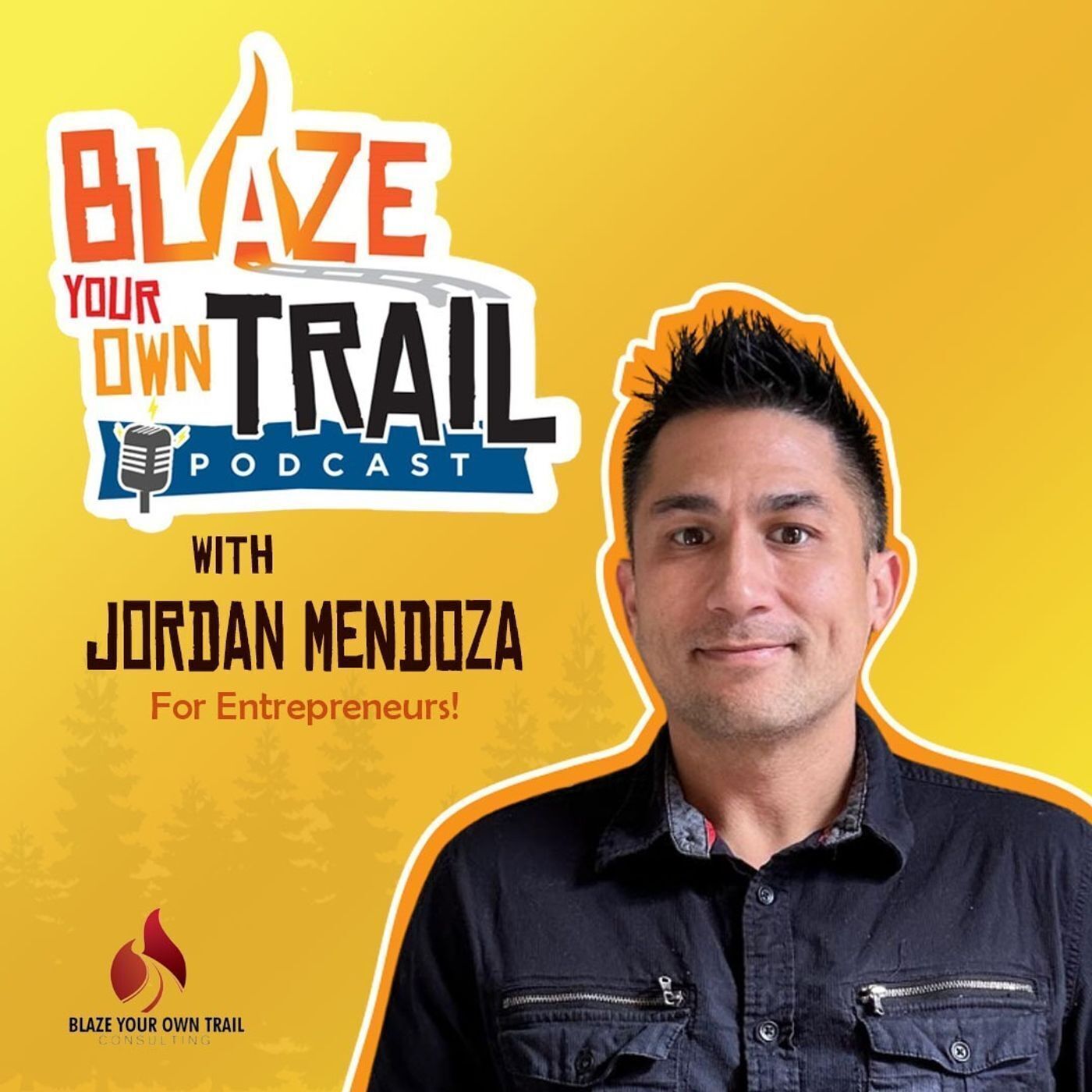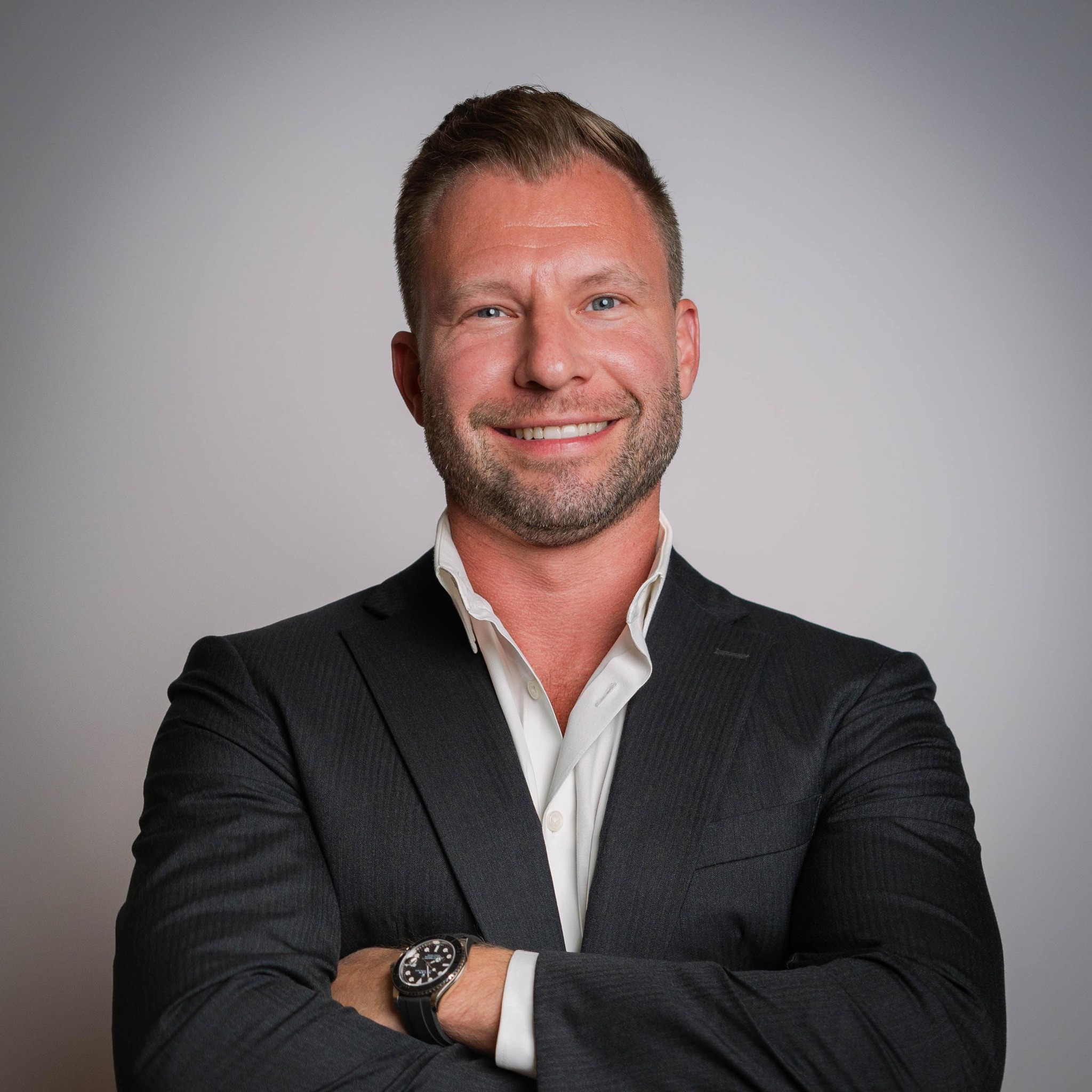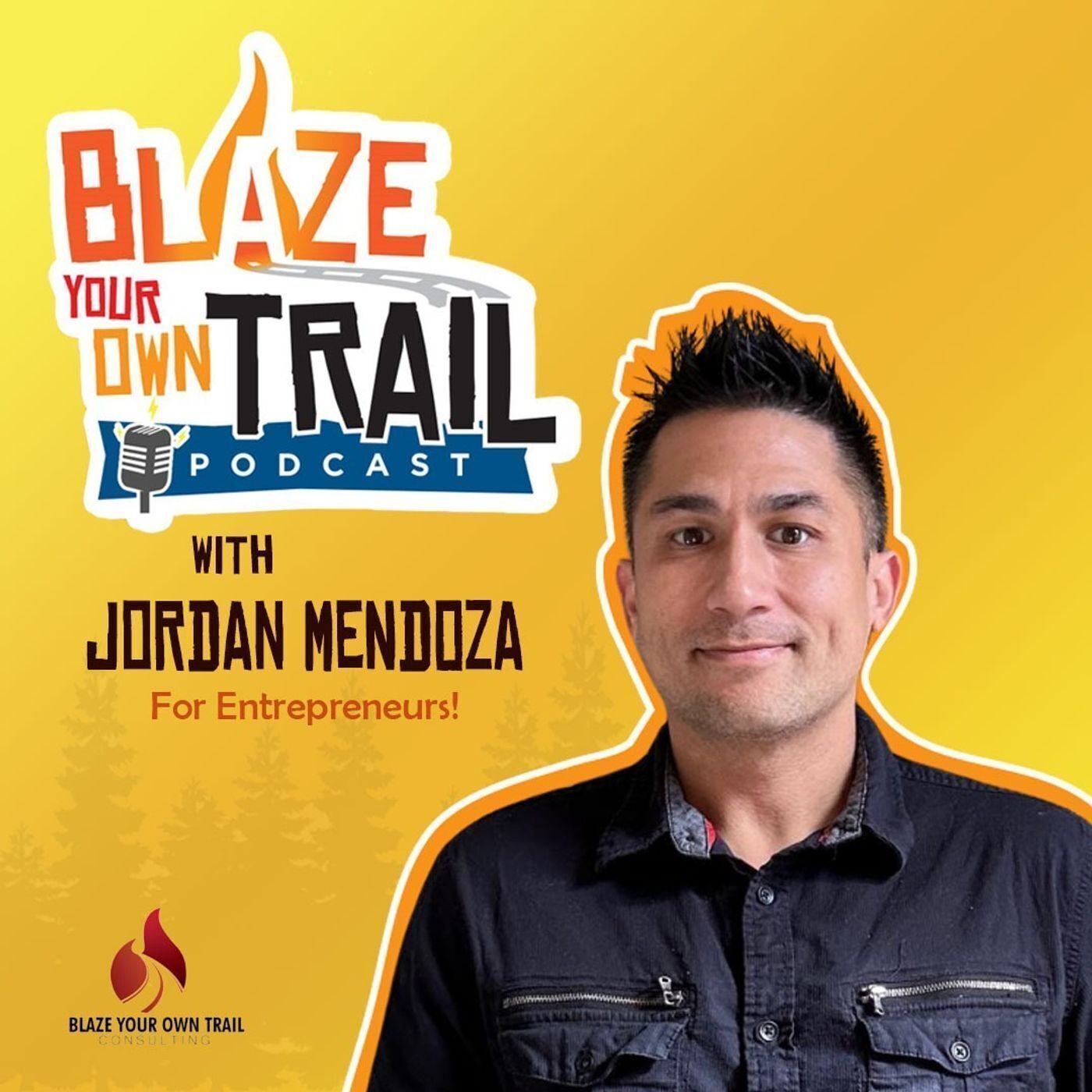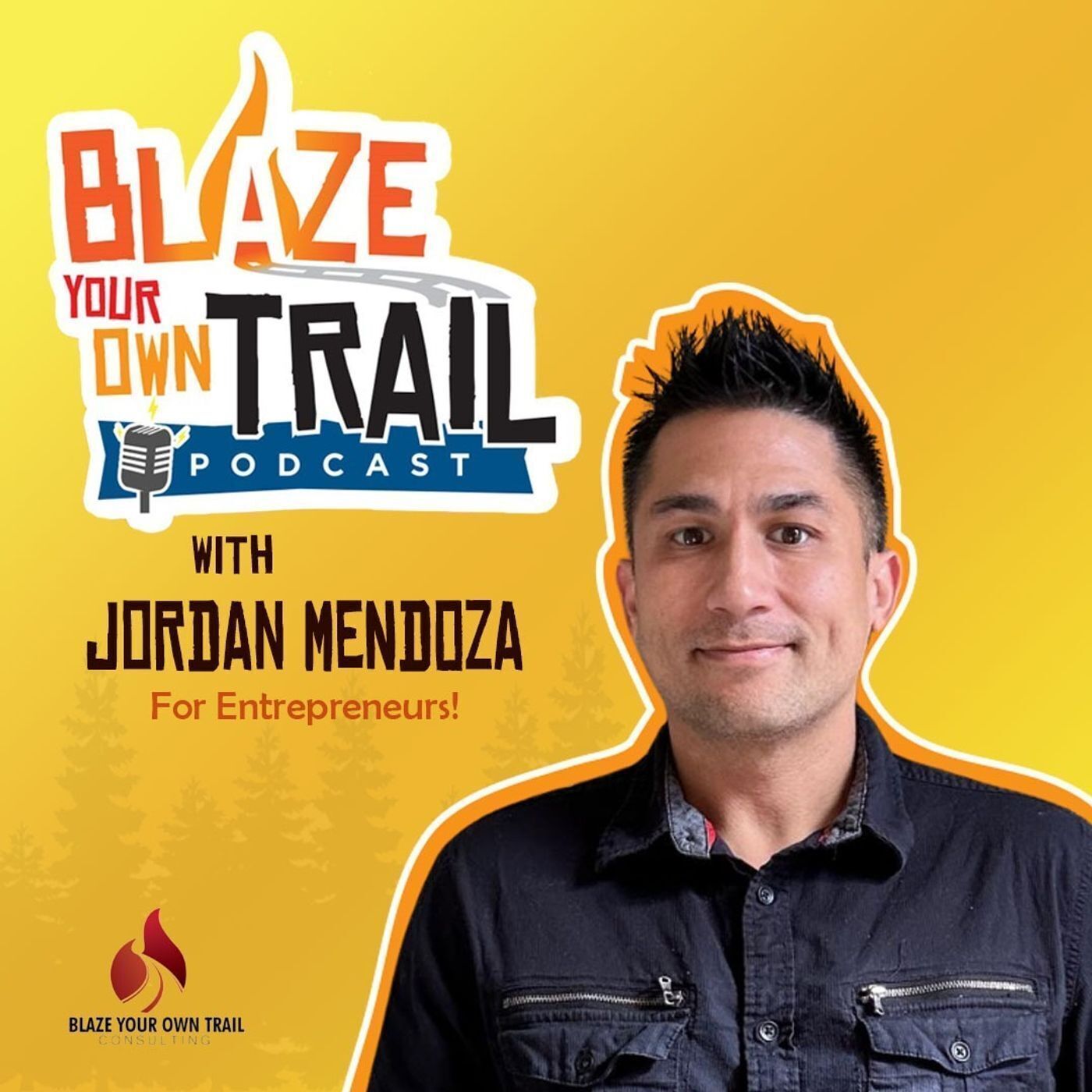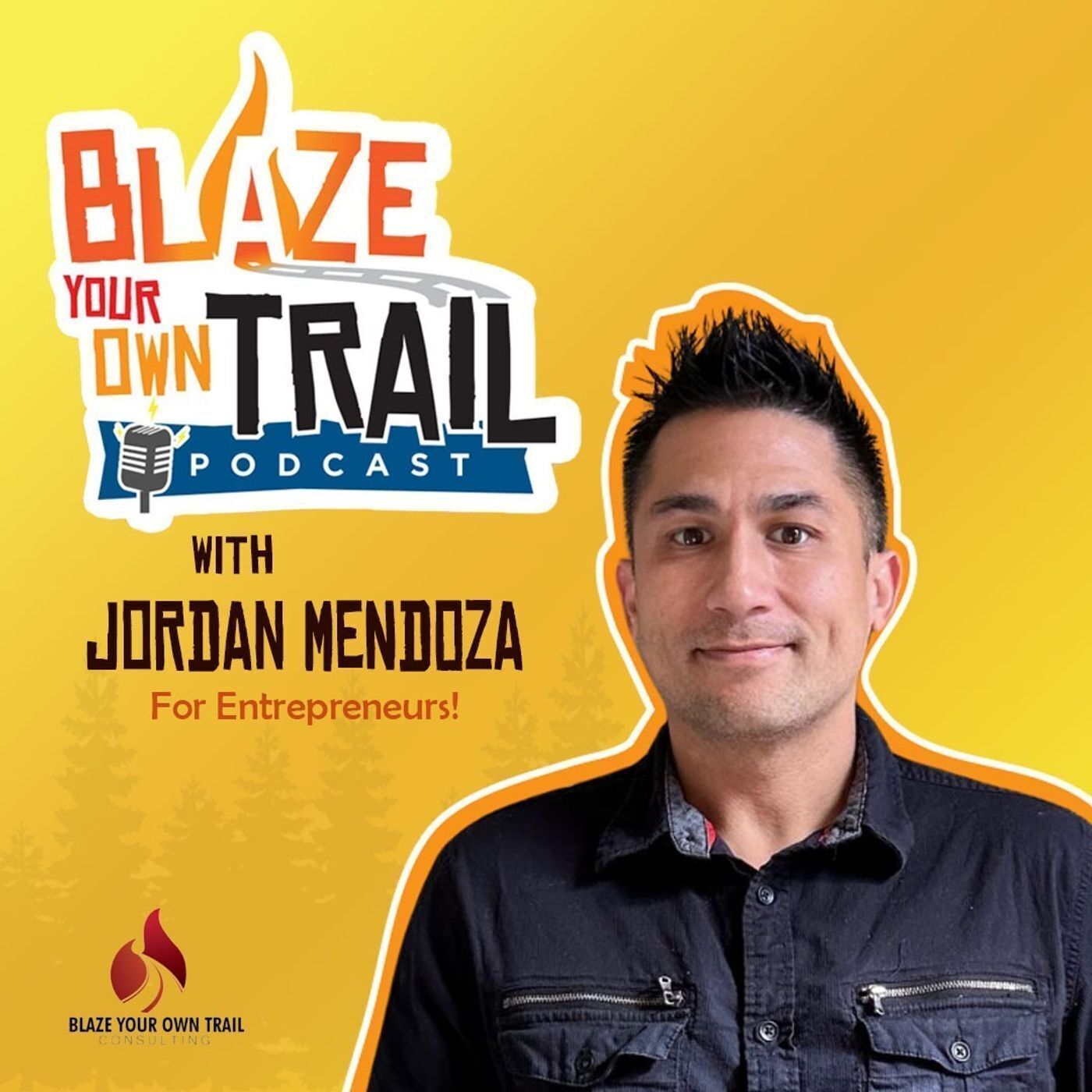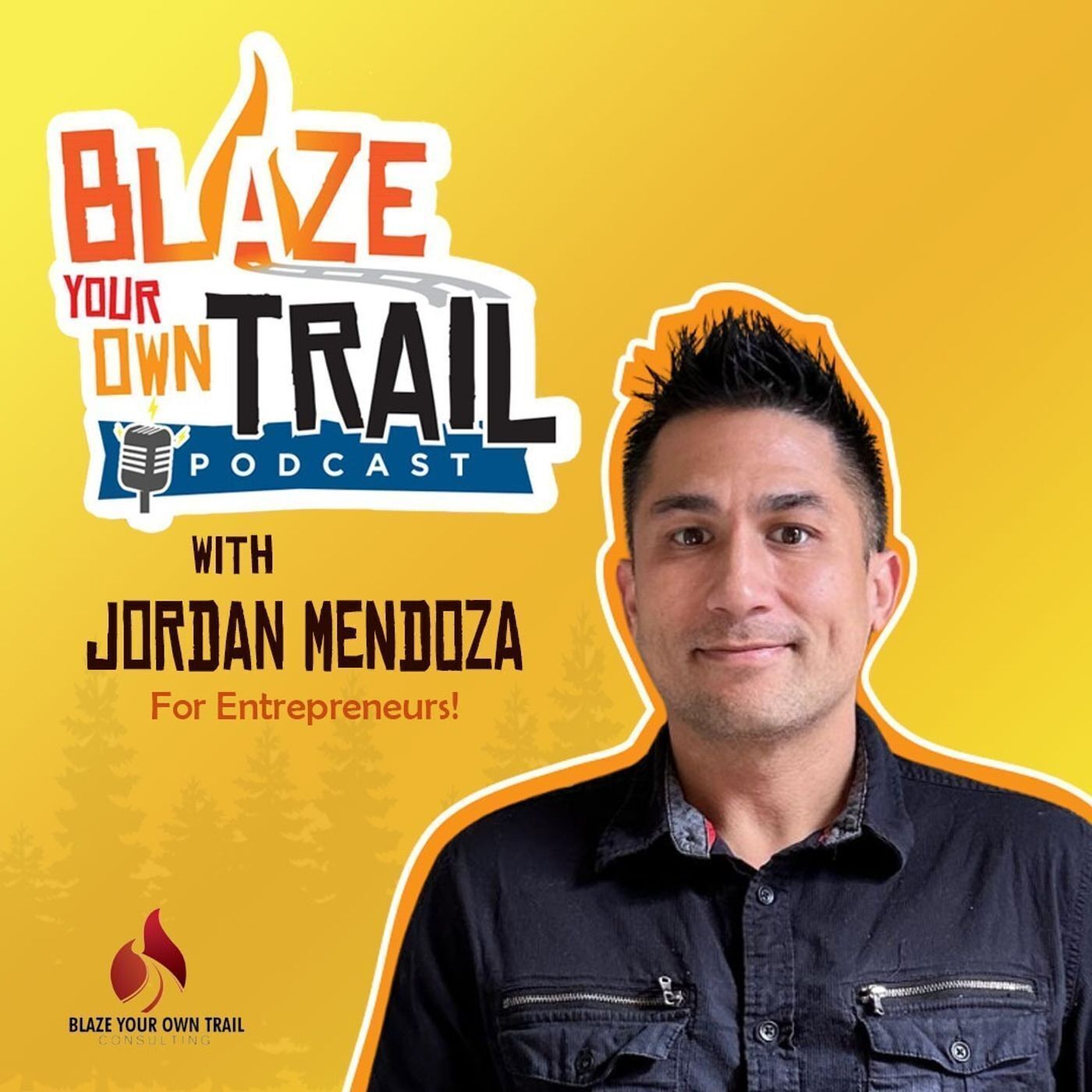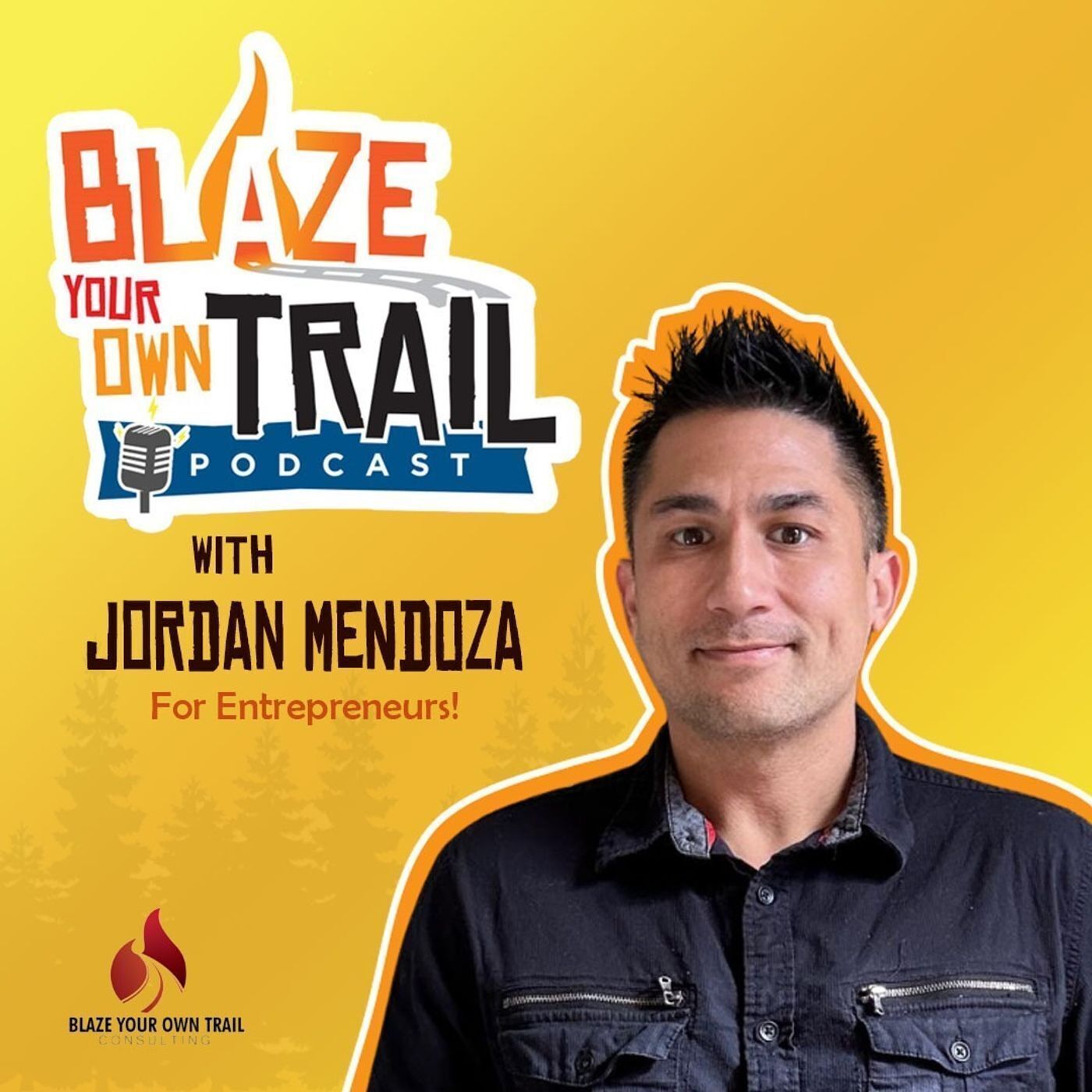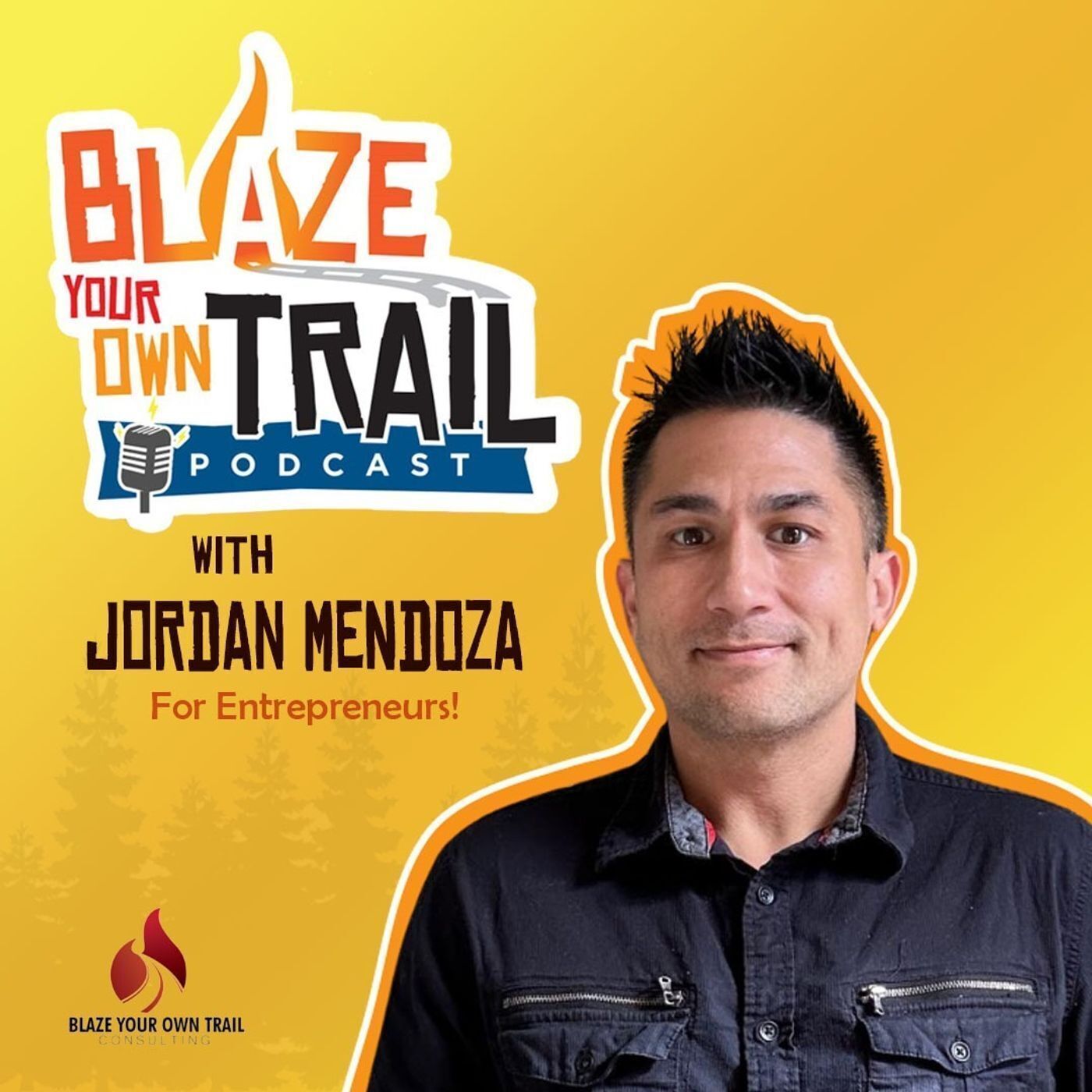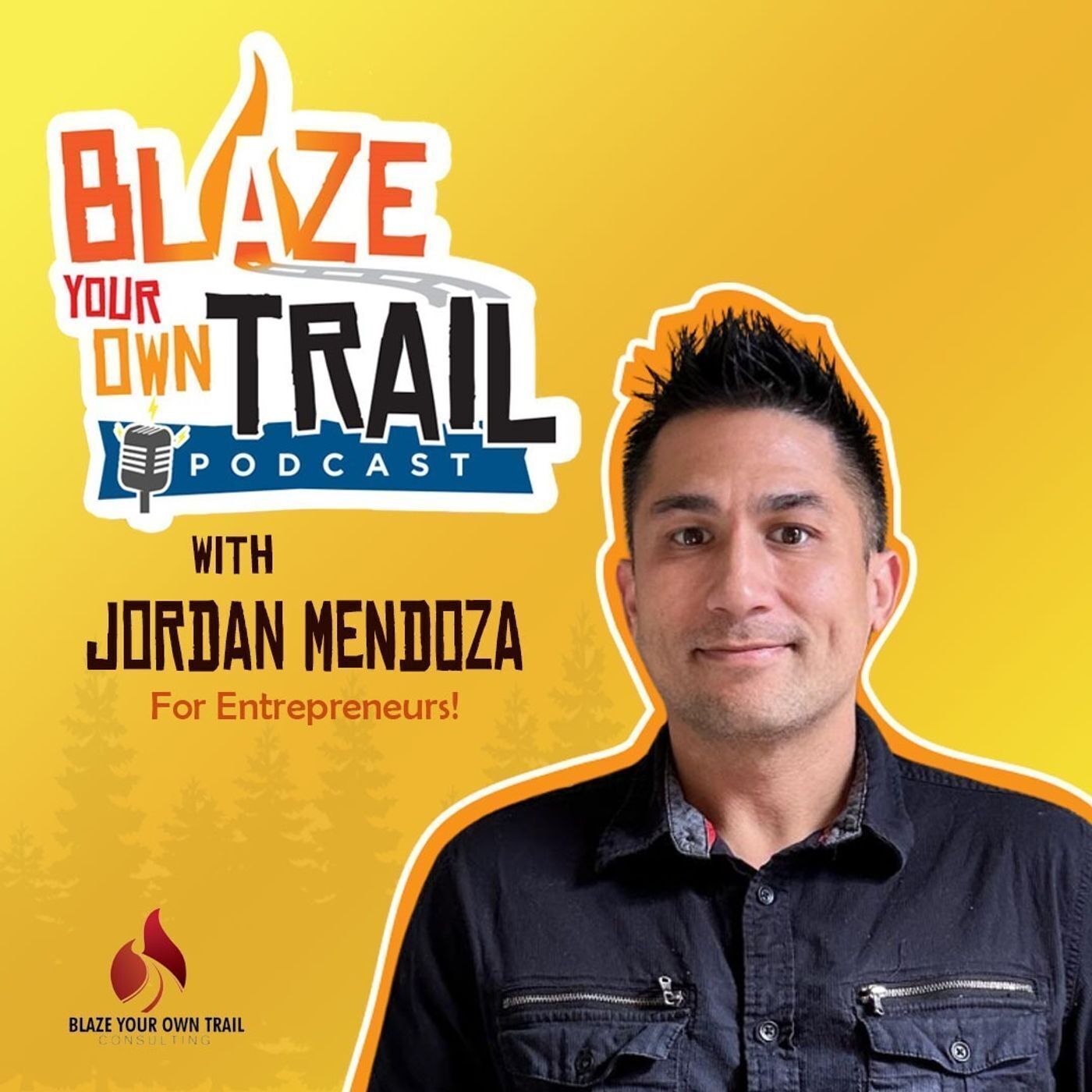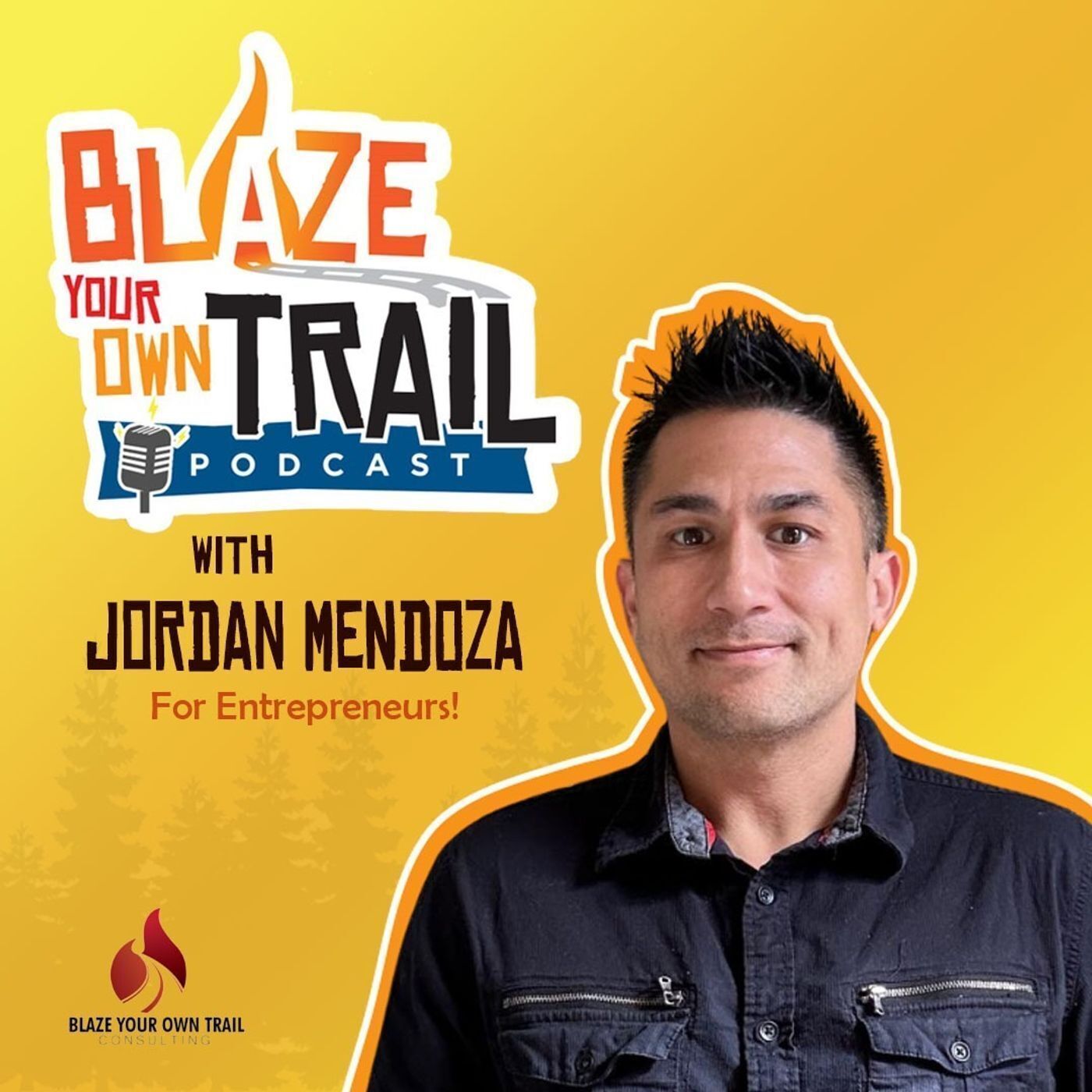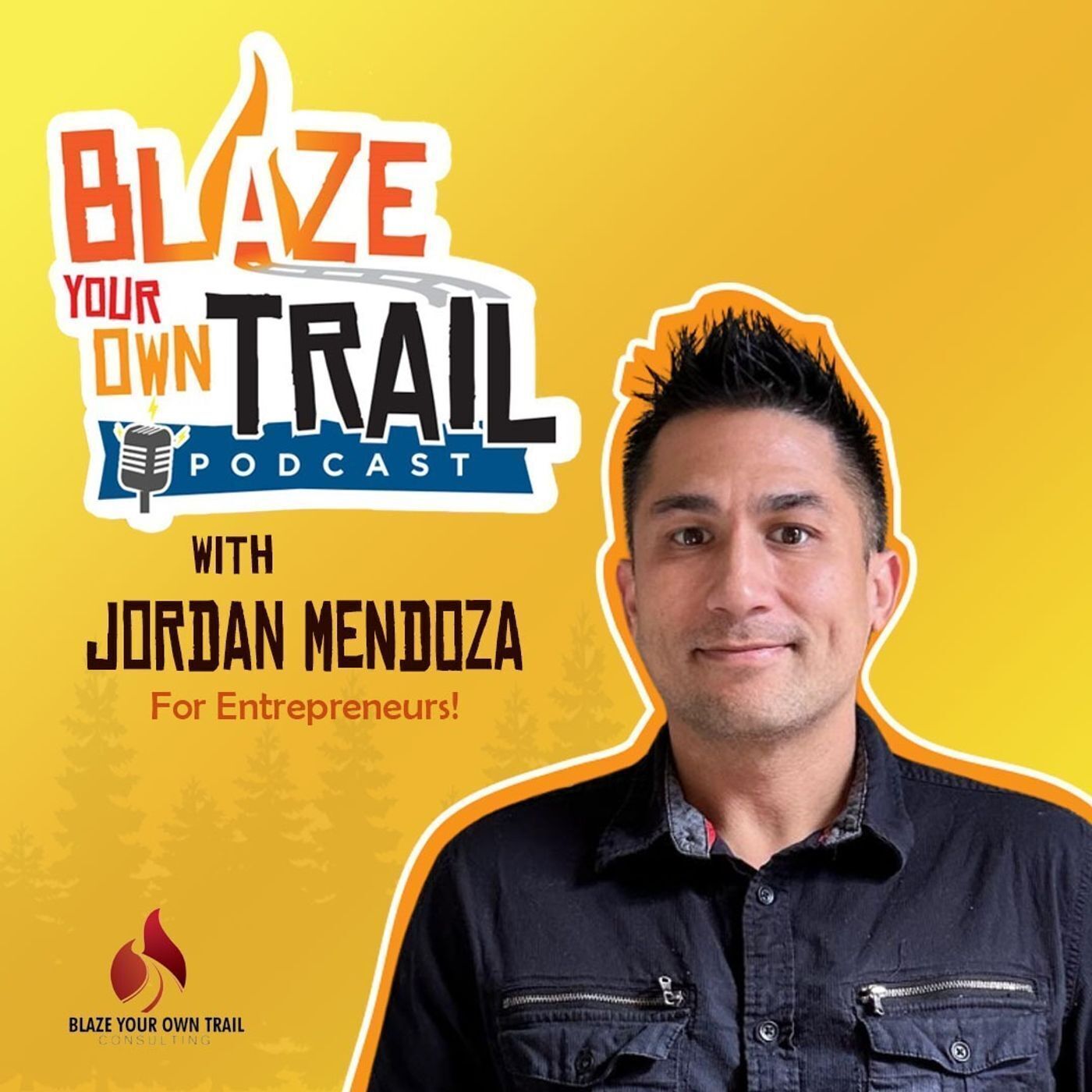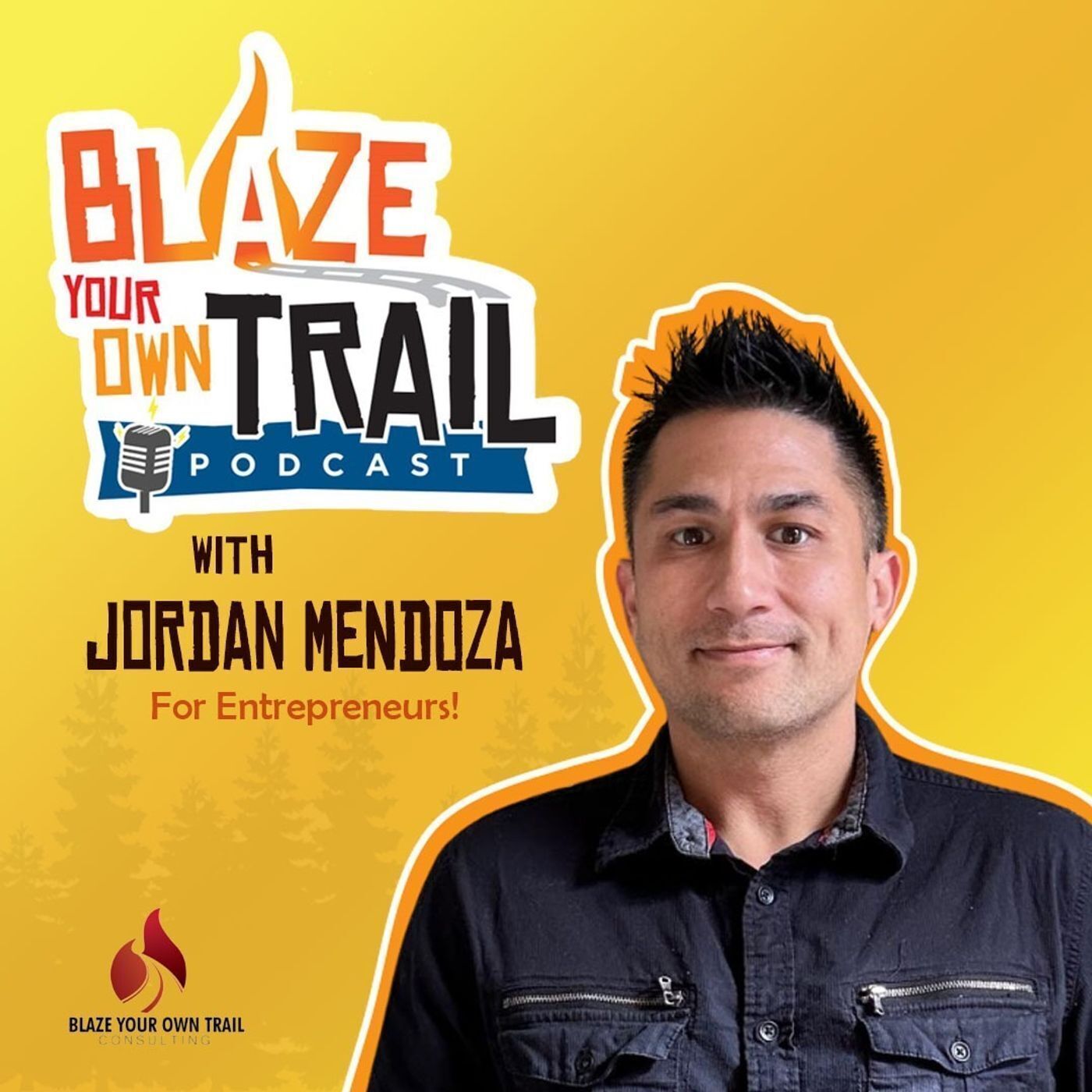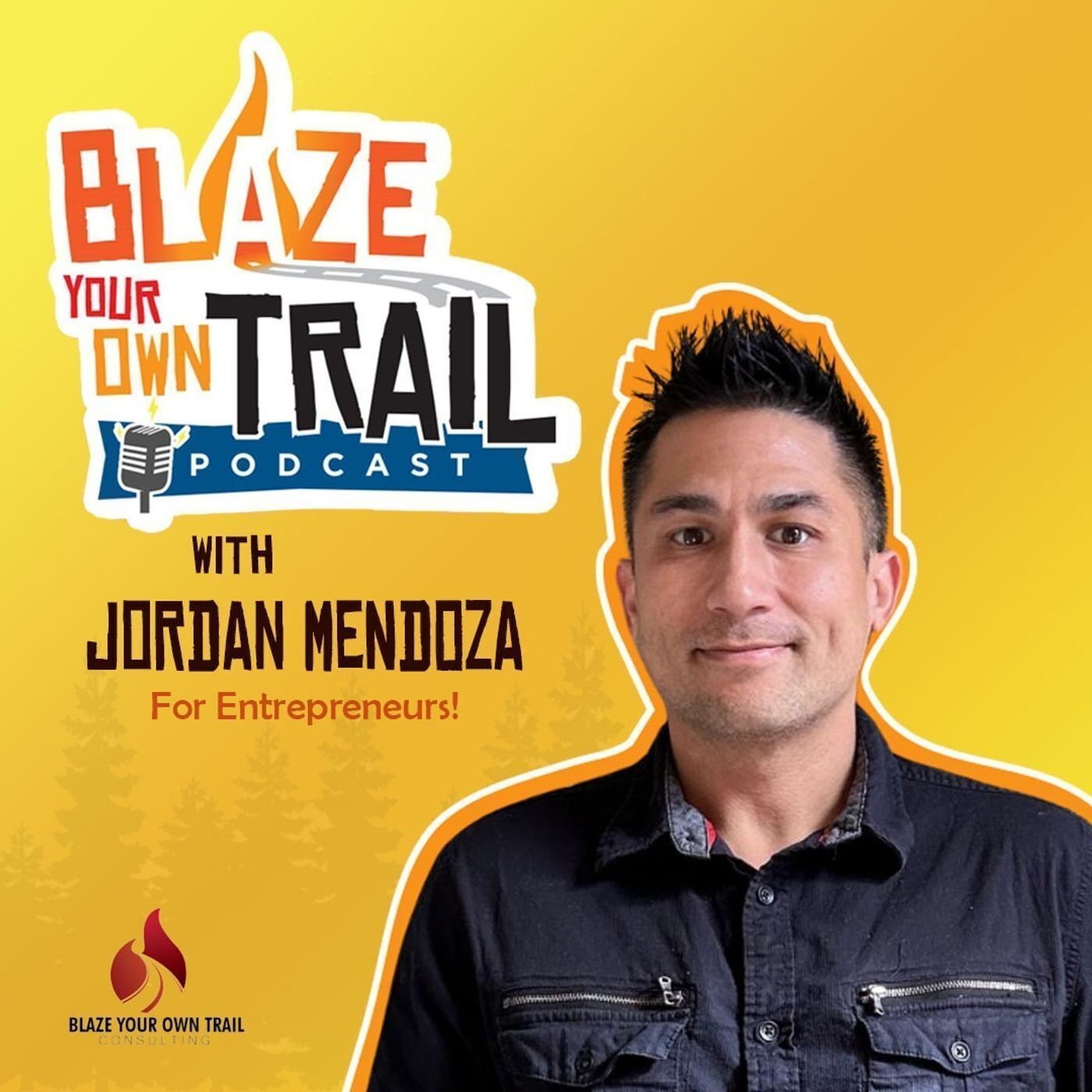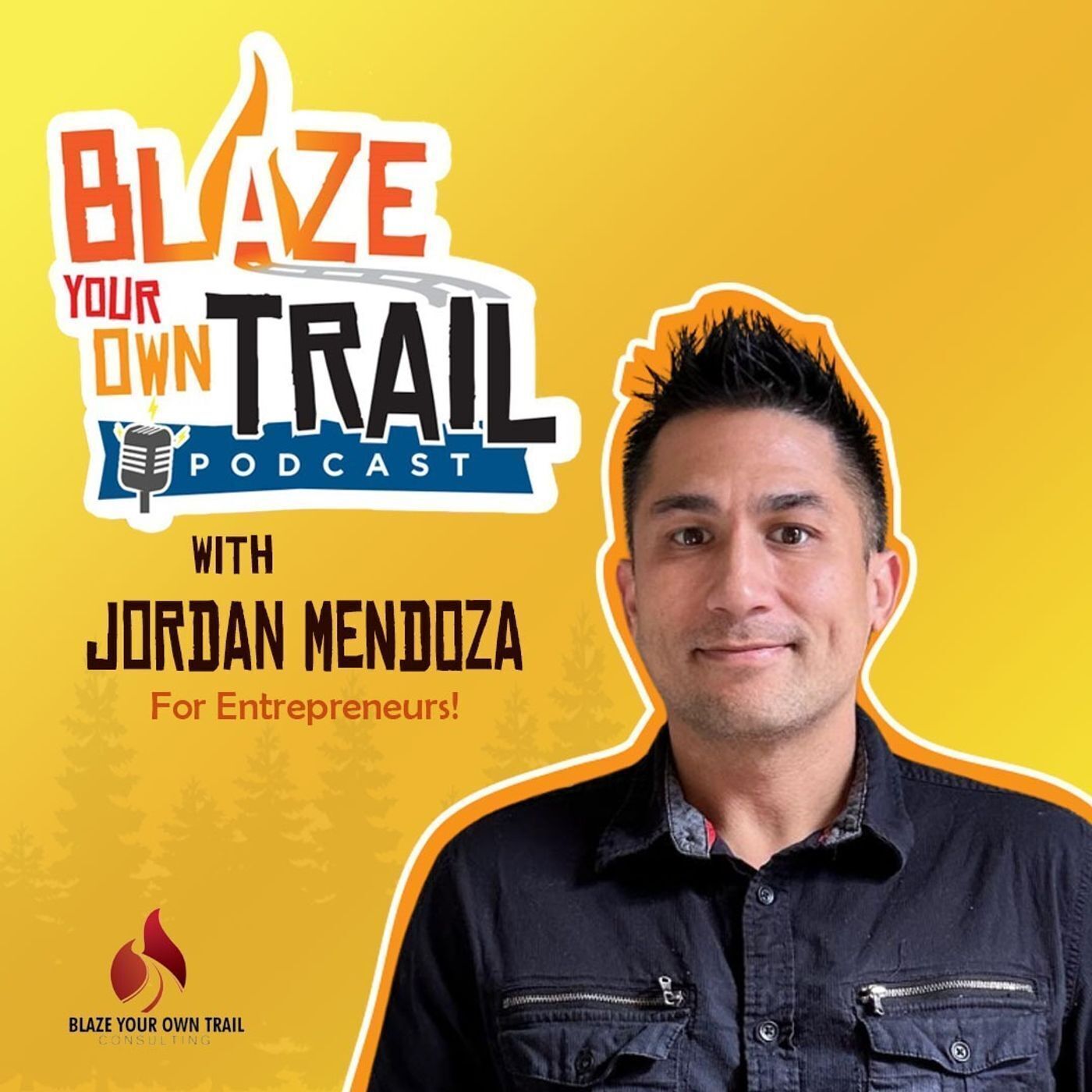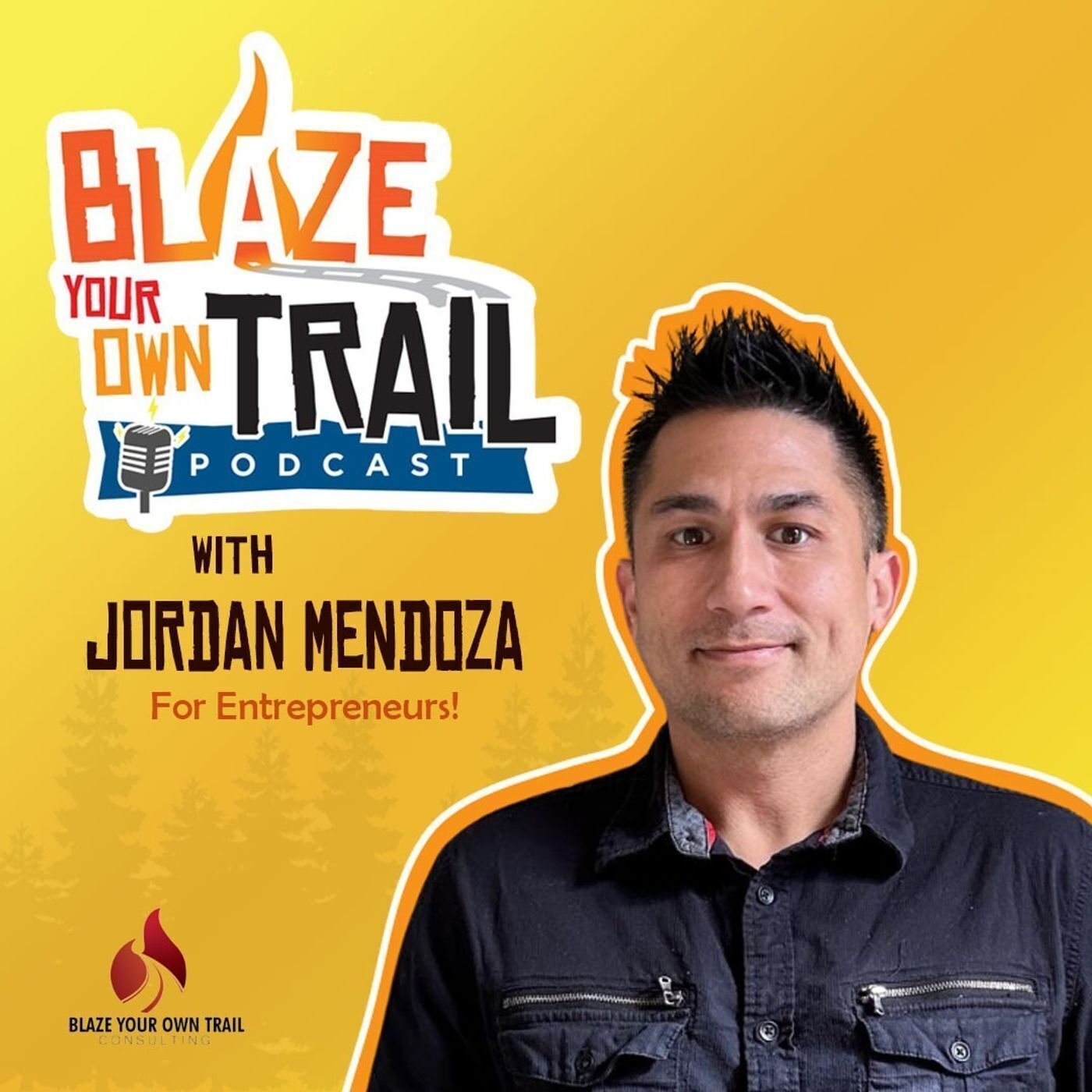Transcript
Jordan Mendoza (00:03.097)
Hello everyone and welcome to the Blaze Your Own Trail podcast. My name is Jordan Mendoza. I'm your host and I've got a very special guest today. His name is Justin Freistadt and I'm going to have him tell you a little bit about who he is and what he does today.
Justin Freishtat (00:19.662)
Well Jordan, it's great to be here. This is gonna be a lot of fun. A little bit about me. I'm a hedge fund manager, private equity fund manager. All these fun words to say what we do in the investment world. But private placement, fund manager, I'd say that's the number one thing. I'm also a strategic advisor at a publicly traded company on the capital advisory there. And then we've got a social media marketing business and a lot of the businesses we buy within our private equity fund.
have some roles in those too. So we're wearing a lot of hats and we're building a lot of things and it's a lot of fun right now.
Jordan Mendoza (00:54.603)
Awesome. Appreciate you sharing that. my favorite part of the show, Justin has truly taken a rewind and getting deep context into our guests story and their journey. So let's dive back. Where were you born and raised? And what kind of kid were you? What did you get into? Were you more into the academic side of things? Were you into sports? Did you kind of get yourself into both? We'd love to find out some context.
Justin Freishtat (01:19.362)
Yeah, so I was born and raised in Washington, DC. I grew up in a town called Clarksville in Maryland, right outside the city and was always very active, crazy ADHD kid. I played baseball, hockey. Eventually hockey took over the number one position and I played all the way through high school, junior and college. But yeah, academics never really worked for me. I just couldn't get motivated to do things I wasn't interested in. So I always had terrible grades, but I was building
very niche skills, right? One summer I decided I was gonna start playing guitar, became very good at that instrument. Then it was piano, drums, bass, start learning everything in music. And that's actually what got me into college. It wasn't my grades, it was that I got into a prestigious music school on a hockey scholarship. very, very interesting path that got me there. And then I spent six years in college bouncing around trying to figure out what I wanted to do with my life. I still don't have any degrees.
And dropping out of college to go into door-to-door sales is actually what made me realize what my life's path was going to be. in a certain way, would say sales kind of saved my life because I really felt lost, that there was just no place for me in this world.
Jordan Mendoza (02:35.287)
Yeah, well I can definitely relate on the academic side. My preference was to be break dancing in the halls with my friends in high school versus you know going to class unless it was a class that I enjoyed and then I'm like okay I'm there I'll get a good grade in this one because I'm having fun. So I can definitely relate to that and so six years in college didn't finish but I'm sure you don't I'm sure you're just as excited to not have the degree as maybe
as if you did have it, if you're anything like me, you know, I didn't go to school and I knew I didn't want to go to college just because I could see the writing on the wall. was going to go waste someone else's money or not do anything and never finish. And I was like, yeah, it's probably not good, not a good idea. So what was it like growing up in Metro DC? So I spent a majority of my summers from 12 basically all through high school.
in Metro DC. My dad lived 28th Street, Northwest, like not far from like Rock Creek Park. I'm sure you're familiar with that area, but what did you enjoy about growing up in the DMV?
Justin Freishtat (03:44.992)
I mean, it was a very interesting place to grow up. I mean, I was living halfway between DC and Baltimore. So it was, you're kind of identifying as like, live, I'm from Baltimore. I'm from Washington, DC. But like you said, the DMV is kind of its own state in itself. It's a very unique place, very transient. Most people are either working for the government or they're a contractor that does something for the government. So it's a very politically charged place. I don't think it was really like that until
the pandemic where it just caused insane division in the area. And that's ultimately why I left is I just didn't want to be around that anymore. But growing up there, it really wasn't like that. It was a very diverse place. You people from all over the world that have moved into the DMV. So, you you met people of all all types of origins, which I thought was really cool. But yeah, I mean, I really didn't get around much like I didn't leave to go to college. I just stayed there my whole my whole life. So I think leaving was one of the most eye opening things.
And it's something I really recommend for everybody is, at certain points you should move to a new city and force yourself to build new networks and get different life experiences. that's something that, getting into my thirties, I was like, really want to get a change of scenery, born and raised in the same place.
Jordan Mendoza (04:58.253)
Yeah, so what did you, did your family do kind of what me and my wife did when living in, we were actually living in Bethesda, Maryland at the time, but anytime family or friends would come in town, we'd end up taking them, where will we take them, Justin? You probably know right in your head where we take our friends and family when they would come in town.
Justin Freishtat (05:18.158)
DC, let's go see the monument.
Jordan Mendoza (05:19.449)
DC to the national mall, right? We, and so we ended up being a free tour guide, unpaid tour guide every time people would come in. And so I don't know if this is right for some listeners, but like, got tired of going to these museums and some people might say, do you realize these museums that you're talking about? Like, yes, I do realize it, but first, a, I'm not a museum guy. Don't really enjoy it in the first place. B, I don't really like touring people around.
You know, so, but we had to do that because when you lived in DC, people want to come visit you. Why? Because they want to see the national mall. They want to see all the historical sites. And so you end up being the volunteer tour guides. Yeah. But, I don't know if you had to do that a bunch when your friends came in and, cause it is the thing people want to see it. They want to be at least once. And I do feel like you've got to experience 4th of July in DC one time.
Justin Freishtat (06:00.654)
present.
Jordan Mendoza (06:14.389)
with the two million crazy people. it is fun to do at least once. But doing it every time someone comes in town, not my preference.
Justin Freishtat (06:24.568)
Yep, we did it a ton in college because I went to UMBC out of Baltimore playing hockey there and all the hockey recruits were from other places up north and you know, they all wanted to go down to see DC. That's what we were doing constantly.
Jordan Mendoza (06:36.677)
Yep. At least the transportation, the public transportation there, the Metro, at least it's good. You can get around pretty quickly. You don't have to Uber everywhere like some cities, you're Ubering everywhere. You could just kind of jump on the subway and get around town. So let's talk door-to-door sales because you mentioned something earlier that probably piqued some people's attention. You said that door-to-door or maybe not door-to-door, but sales in general saved your life.
So what was it about sales? And I do have five years experience in door-to-door sales, so I probably have some opinions similar to you, but I'd love for you to share with the audience, what was it like, A, how did you get into it? Was it an ad, was it a friend, was it something like that? And then B, what was it about it that kind of opened your eyes to what the world could look like for you?
Justin Freishtat (07:34.062)
I think for me it was mostly how the world operates on incentives and in my brain I could never really wrap my head around getting paid by the hour. It was always like, or a salary. In my brain it was like, well how hard do I work? I don't really know. They're gonna pay me the same. It's just the weirdest dynamic which is completely not motivating to me. Kind of like grades. I don't care what it on a scorecard. What does that do for my life? So when I was working in a warehouse,
It was actually my dad's startup company at the time. And I'm packing orders for $7 an hour. And then I'm driving the trucks and doing deliveries, maybe got a little raised to like $9 an hour. I'm looking at these sales guys that would come in for their sales meeting when the deliveries were done mid days when those guys were coming in to go do work in the evenings, because all those in-home appointments, those sales are done when families are done, they come home at the end of the day. So you work from, let's say, three o'clock to 10 o'clock every day in people's homes.
They would they would come back and say, oh, I made a thousand bucks today. And I'm like, I can't make that in several weeks. And he just did that in one day. And I saw the potential of, you know, making six figures at the time. It was like a hundred grand. That's like a pipe dream. But I was watching these people do it in a door to door sale. And I could wrap my head around it because it was like if I do well, I get paid by the marketplace in direct proportion to what I've produced. There's just no, you know, in between on that. So
I really liked that. You always know where you stand in sales. You get exactly what you deserve and you can quantify it. So to me, that's motivating, right? If I need to show up to produce a result, I'm going to do it and I'm going to get really competitive about it and be the best at it. So I think that's, that's kind of what drove me. If you said, Hey, we're going to pay you a flat rate to do something. I'll probably be the laziest worst person in the company.
Jordan Mendoza (09:25.101)
Yeah. So you prefer performance base, which, which is good, right? Because it keeps you motivated. you know, that there's kind of unlimited potential that you have. just depends on, Hey, if I want to slack off, then I'm going to get slack off level of pay, right? If I want to work hard and do go the extra mile that I'm probably going to get these extra incentives and bonuses. And so learning about it and understanding the revenue potential is one thing going out and getting yelled at and cussed at and chased away and.
cops call it on you, that's a whole different story. So talk the audience a little bit through, you know, what was your first maybe 30 days like out in the field? Because I want people to really truly understand what it's like to get up day in and day out and know that you're gonna go out and hear way more nos than you are yeses and understand that that's okay and how to get around some of the objections and how...
What about some of the dynamics of personalities that you interact with? Because there's so much depth when it comes to going and dealing with somebody in the comfort of their home. lot of things can happen. So share it with the audience at first. 30 Days is as a door-to-door sales guy.
Justin Freishtat (10:40.046)
probably the most terrifying thing you'll ever do in your life. I can't remember where I read it, but door-to-door sales is, I think, the most terrifying thing in front of public speaking. And then when you look at sales verticals, door-to-door sales is the most difficult sale you could ever do. I think starting with that as your first sales situation is, you just can't even care about the results. You just have to care about showing up and going through it and being able to...
Like you said, get doors slammed in your face, get your face kicked in, and at the end of the day, you're like, okay, I'm still standing, I'm here, nothing happened, I'm alive, I can show up and do it again. So I think there's a direct correlation to suffering, to a result. I don't think any of us love every aspect of what we do, so the ability to lock into that suffering is a huge proponent of who's gonna be successful.
I mean that's really what the first 30 days was like, terrifying. Some of them were appointment based, but I would start canvassing, going door to door, offering a family some samples of our product in exchange for their information. Then you follow up, you call them, set the appointment, then come back to the house. So the first couple weeks that I did it, got a bunch of samples out, took me a few weeks to get my first appointment.
You know, so like you get a month into it, you go to that first appointment, you obviously don't sell it. You suck, right? Maybe you get a sympathy sale, but I think it's just being able to know that you're supposed to suck at something when you first start. Like nobody great at something started that way. So the ability to just lock in and suffer through that first couple of weeks and then you get your first sale and then it's like, wow, this works. And then you just keep going and then you, you deal with, you know, a lot of people saying no.
And I think it's just the compounding of being able to suffer until it gets fun and it's working and you're getting momentum. And then eventually it switches to referrals you're getting from these people. So you're not gonna hold out less. And the whole thing becomes fun when you just have staying power. The amount of people that came in and out of that company that would quit right before it's about to work. It's just something about the human condition is you just can't put an expiration date.
Justin Freishtat (12:54.25)
on your goals on the results. can't be worried about when it's going to happen. You just got to keep going until it does and inevitably you always win.
Jordan Mendoza (13:02.137)
That's it. Yeah, it's all about putting in the reps every day, being consistent, not losing your attitude, which is very easy to do. It's very easy to say not to do, very easy to do, especially when you're getting rained on and or it's colder out. Right. So there's so many different things that impact you when you're going out and knocking on doors because, you know, we can't control the weather. We can't control people's attitudes. We can't control the territory. You know, there's so many things that you can not control. The only thing you can control out there
is your attitude and are you gonna go back the next day? Because it is a numbers game. The more people you talk to, the more money you make. mean, that's essentially how sales works in general. But door to door is definitely not for the faint of heart. My son who's 20, he's about to hit his first full year knocking on doors in September and he does it for a home remodeling company. And they're a debt-free home remodeling company, nationwide company.
And he, man, it's, it's, it's fun being on the other side of the seat as a parent. So I can like text him every day and say, Hey, you've got this. How's your day going? What's, what's it looking like today? You know, and if he gets demotivated, I can just pick him up and, motivate. didn't have somebody like that in the nineties when I was doing door to door sales that I could, didn't have a cell phone, I don't think so. Couldn't text anybody. So for him to have somebody in his corner that's like cheering him on, I think it's definitely helpful.
But it doesn't mean it's easy, right? You got to go through the hard things, like you said earlier, the sucky parts in order to get good enough to get better results. So you did that for how long did you stay in that role? And then what did that kind of spark in you from the sales side or from a career path side?
Justin Freishtat (14:50.85)
Yeah, it was quite a ride. I I started off literally in the warehouse of that company, then driving trucks, then moving into sales, but I wasn't making enough money in sales at first. So I kept driving the truck on the weekend. you know, I might do deliveries all morning and then go out for the sales schedule at night. So yeah, I was probably working 12, 14 hours a day on a regular basis until, you know, the sales was providing enough that I could stop doing the hourly work. So it's another reason why I just have.
just no tolerance for excuses. You're either gonna put in the work and figure it out and be the outlier or you're not. And then once I became fully sufficient, I could take care of myself in sales, I could pay my rent, I could live on my own, it was the greatest feeling I've ever had. ever will add up to the first time you can take care of yourself financially. It's very empowering. Making a hundred grand and making a million is never gonna feel as good as that.
At that point, I was like, okay, well, I want to set the records. I want to be the best that ever did this. I got really competitive about it. The guy who had all the industry records had been doing it for 30 years. And I just kind of reverse engineered his schedule and said, okay, how does he do these numbers? And he told me, like, well, I work Saturdays and all the other guys work Monday through Friday. And that's how I get an edge. So I thought to myself, all right, well, if I'm going to beat him, I'm going to have to at least do that. But if I'm going to catch him, I'm going to need the experience. I'm have to work Sundays too.
So I went to a seven day a week work schedule and then it was, okay, well how are you tactically so much better? Why is your closing percentage better? He's like, I read one book a month in sales, psychology and marketing and all this stuff. I'm like, all right, well I'm gonna do two, right? So I basically took what the top performer in the industry had ever done and just doubled it. I was just like, I'm just gonna outwork everyone and it took about five years to set all the records, know, sales in a year, sales in a month, still have them all.
because the year that I broke those records, I set out on January 1st and I was like, I'm doing nothing this year except going after this record. And the record was about a million and a half in sales in this industry in a year and I did over three million that year. So I doubled the previous record. And I literally worked 365. I just didn't stop, just did it for one year. It was the coolest thing I'd ever done because it didn't feel like a grind because it's actually what I wanted to do. I was so focused on it. So at that point,
Justin Freishtat (17:14.042)
It was either, okay, I've got to, you know, I've maxed out this industry. I can't make any more money doing this. I can't work any harder. I need leverage or I need to leave and go to a bigger, higher ticket product where I can make more money. So I decided to start building teams underneath me, hiring, recruiting, training the salespeople there. I got equity into the company and we rode that thing out. The end of it, we had done 87 million in sales and we sold it off to a private equity firm. And that's how I transitioned into the capital raising world.
which is essentially saying, OK, this is sales as well, but we're going into the highest ticket, hardest sale, most competitive arena there is with the biggest margins.
Jordan Mendoza (17:54.937)
Very cool. And did that decision attribute to you going through the process of an acquisition? And maybe you're like, ding, ding, ding, ding, ding. This could be that next high ticket opportunity because you were looking at probably what the other side, what the company was going to make, what everyone was going to be making off of this one transaction. I'd love just to know. It just instantly popped in my head. was like, I got to ask him this.
Justin Freishtat (18:20.886)
It made it very real, but in full transparency, the entire time I was doing door-to-door sales, I knew I was meant for more, I was meant for bigger, and I knew I wanted to be in that world. I was a get up every day and watch CNBC, read books on real estate, read books on trading, read books on fundamental and technical analysis. I was obsessed with finance, mostly because I knew I didn't want to grind door-to-door for the rest of my life, and I needed to figure out a way to take this money I was making, turn it into wealth.
you know, buy my freedom essentially. And I got, just loved the industry. I had these limiting beliefs though. I was like, well, I never graduated. I didn't even go get an MBA. I didn't intern at Goldman Sachs. Like I just, I'll never be able to be in this world is what I really believed. But I figured I'll learn it front to back. I want to manage my own money. I don't want to use a financial advisor. I don't want to give away fees. Like I wanted to be able to trust myself with money once, once I had it. So that's how it started. And then when we sold the company and I had to figure out where I was going next,
I was really certain that I wanted to stay in my lane in what I'm good at, which is sales, marketing, people, relationships. I don't want to get into the operations side of things. I don't want to underwrite deals. So that's why I was looking for partners in the fund industry that were excellent at those things that I could bring my skill set to and partner. And it didn't take me very long to find my partners in the first fund. And we built that from scratch. None of us had had a fund before and we built that to 20 million and.
in less than 12 months. it was very interesting. You know, it took me, you know, 10 years to do 10 million in sales door to door. And then it took me one year to go to 20 million in a better view.
Jordan Mendoza (20:01.185)
Yeah, love it. Love it. But the, you know, that time in door-to-door sales, would you say that attributed to accelerated learning in what you started to do next?
Justin Freishtat (20:13.952)
No question, I think this is something people really discount, is it doesn't matter where you are, you gotta go all out in that space. If you're going into people's homes every day and presenting a product, it doesn't matter if it's low ticket, like at Safe Space Global at our company, we've got a lot of people that came from Southwestern selling books door to door. A fairly low ticket sale, 300 bucks to maybe $1,500. But when you get excellent at presenting something and you get great,
at talking to people and dealing with different personalities and all these different things, that will translate into the next vertical you go up the ladder in your career. It's kind of like when people are like, I don't want to start my personal brand yet, I'm not ready. It's like, no, like you start when you aren't ready so that you can build the skills. Like go on podcasts, don't prepare. You're not going to be ready. You haven't done it a ton. So I think there's just no substitute for diving in, getting the reps.
and then looking at the long term of what these skills you're building can translate into when you're ready to go to a higher level.
Jordan Mendoza (21:15.301)
Yeah, I love it. Yeah. I went from door to door five years to 15 year career in property management. And, uh, why, why was I able to stay there that long? think because I kept moving up. kept advancing. started in sales. Then I became an assistant manager, which was like a glorified bookkeeper. Worst, worst role ever. So I crushed it, got assistant manager of the year and got promoted.
to property manager, which was the goal. was like, I want to manage these properties. Then I realized, well, this is not that great. Like I'm managing these multimillion dollar buildings, but I'm, I don't really get to build teams. And so I went into training and did that for eight years. then getting all the skillsets in 15 years left to, to do it as a consultant, right? Because there's a lot more revenue when you can do it on your own, but a lot of the stops on the way. And I like how you alluded to it as.
Justin Freishtat (21:59.214)
15.
Jordan Mendoza (22:10.713)
You got to go put in the reps. You got to go get consistency. You got to go figure out the systems and the framework, and then you can take that and apply it to the next thing.
Justin Freishtat (22:18.135)
them.
Yeah, I think it's so valuable. It's a lot of people, they're like, I want to be in this business and they'll just start the business. And I just, for me, it's like, yeah, you can do that. I don't ever want to discourage someone from doing that. But I think if you can go work for somebody first that's done that at an extremely high level, even if it's for a short period of time, when you go to do that on your own thing, you're going to have so much more firepower and learning from someone else's experience. And that's the main reason why I
didn't go into the fun world and said, I'm gonna start my own. I wanted to partner with people that have already done it, that I could learn a ton from, that have connections at really high levels. And it's been a beautiful thing because now I can see what great deals actually look like. It's very different when you have access to this whole world of, especially real estate syndication, like it's everywhere. And you get an idea of what the deals look like and then you get around the best operators and it's like, whoa, these deals are 10 times better.
Jordan Mendoza (23:17.377)
And so what was one of the first deals that you got involved with your group? You mentioned you brought your skill sets, you learned everything that you could without having to get it through college so that you could speak the language essentially with these top players. And they obviously had the investing and the underwriting and all those skill sets. And you were able just to Avenger-esque, build the right team to get two results.
So what type of projects was it real estate that you were going after in your first transaction?
Justin Freishtat (23:52.131)
No, it wasn't. It's actually late stage private equity and trading. So when you're brand new and you're starting a fund like we were, you don't have a track record. don't have, it's a very competitive world. So for you to go raise capital, you need something to leverage. And that was, our fund was born out of a relationship that my partner had with a managing director at a $5 billion institution that has access
to all these amazing late stage private equity investments. So we went fund to fund with them so that we could write their track record and say, look, our fund to fund partner was pre IPO on Palantir, Spotify, Airbnb, Lyft, like all the greatest IPO's of the last 10 years, they were on the cap table and they are now on the cap table of these private companies like Flexport and SpaceX. And then we could raise capital into our fund and then SPV into their fund, fund to fund. we're one.
one fund removed from the cap table and then I can give access to some of the best private equity investments in the world to regular accredited investors that wouldn't be able to have that opportunity unless they could go through a fund like ours. So we were hitting a very specific niche, you know, where you can come in for as little as $100,000 and be invested privately in Flexport, SpaceX, companies like that. that was our big competitive edge off the bat.
And then the trading fund was with them as well. They've got a massive trading desk with 20 year track record in swing trading equities. And then we, you know, so we did a blended allocation with them and another brokerage for that first fund. So that way it was, Hey, I know we're brand new, but you know, the, actual asset managers here have 20 year track records with billions of dollars raised. So I think it's just a more humble approach to getting started. And I think you can go faster.
If you leverage quality relationships rather than just trying to do it all yourself.
Jordan Mendoza (25:49.389)
Yeah, no, that's great. And you guys essentially just accelerated your timeline to getting to success by leveraging people that have already been there and done it, and, you know, being able to leverage their, their knowledge, their credibility, their access, their contacts. And that's great. And so, you've probably heard before proximity is power, right? When we can be closest to the people that, already have the things that people want, then, it exponentially increases the timeline. So I love that you all.
did that. And so what happened after that? that a successful? Obviously it was successful. So what was kind of on the agenda once that transaction was done?
Justin Freishtat (26:28.002)
Yeah, so we we've done tons of things. We started a social media marketing business in tandem because that's actually how I raised my first 10 million was from doing things like this media podcasts, going and speaking on physical stages and then building it all through this personal brand that kind of flipped the script on lead flow. So now, you know, the leads are coming to you versus the traditional way of just smiling and dialing and, you know, cold calling, which nobody likes to do that stuff. So.
You know, since then, we've we've done I have some other partners and it was the same kind of thing. It was I got recruited by some guys that have done billions as investment bankers on Wall Street and then going private and starting their fund own tons and tons of real estate and access to incredible relationships with banks. So that's how I got involved in the real estate fund that I'm involved with now, which is Pitch Equity.
And we just did our first deal in that fund and it's over $4 billion of economic development, 120 acres on the water. It's basically building an entire city on the water of Chattanooga there. So again, it's just better partners, better projects, better access, better leverage, more exclusivity. And none of it is because of how good I am at this. I mean, I think I'm pretty good at it, but it's the strategic value you can bring to
other relationships and I think that's the key thing and you're not going to command that respect if you're not able to show the marketplace that and that's why building the personal brand I think is the most important thing you'll ever do because I would have never been recruited to work with these people if I didn't do that.
Jordan Mendoza (28:06.501)
Yeah, a hundred percent. And in 20, 25 and beyond, you know, visibility is the name of the game, right? If you're not visible, if no one knows you, then how are they going to ever want to, you know, do business with you or approach you for opportunities? And I could say too, from building my personal brand on, I've had so many opportunities come about because of it, right? Because people can find you, you're searchable. mean, your messages, you'll just get emails randomly from people and,
I don't know about you, sometimes I'm like, is this real? Like these people really want to talk to me. And then you find out, you're like, okay, wow, it is, it is legit. Right. So, I can agree that it does work, right? You need to get as much attention as you can. and so while we're on that topic, what are, what would you give people from the personal branding aspect? If they were like, you know what, man, can I do this? Is this really for me?
didn't matter what vertical, what industry, but what would maybe be your three pieces of advice for that person that's thinking that, that's listening. Maybe they're listening right now. They're like, you know what, Justin, that's great for you, but like, could I really build a personal brand?
Justin Freishtat (29:17.688)
Yeah, I think everybody can, anybody can. And if you go, like I haven't deleted any of the content. If you wanna go back to my Instagram five years ago and see the videos I was putting out, it's hard to watch, right? Like it's really hard to watch. But in a way, it's like I love doing it because when I look at it and I see how terrible it was, I'm so proud of myself that I did it anyways, right? It's just like, and people are like, well, I'm not gonna be good at, well, of course you're not. Like you need to go do it anyways, even if it's not good.
own where you are because you really want people to respect you and convert down the road. You gotta have a long-term view. Six months, a year, two years. If they watch your growth, that's where the respect's gonna come from, but everybody wants to show up when they've already done it, and it's impossible. You have to build to be the one who did it. So yeah, think number one is getting your mind right about the reality of that, and also,
Am I a full-time content creator? This is the most competitive professional sport in the world, is social media now. The highest paid content creators are making more than the professional athletes. So that's what you're up against. Anybody can be a creator, anybody can do this. So you gotta be real with yourself off the bat. Am I going to spend 12 hours a day studying hooks, writing scripts, viral audio, all of these things to have your content still maybe not perform, or do you wanna say off the bat, I'm a business owner, I'm doing something in the real world?
I'm not a full-time content creator. I'm not gonna make my money off views. And if that's not you, you should wave the white flag off the bat and say, what strategies can I use to build this brand, even though my content can't compete with the best content creators in the world? And you do that through companies like Kern's Marketing, our social media marketing business. We leverage celebrities, we leverage influencers, relationships, again, in the space that can distribute your content, that can collaborate with you, ways for us for you to actually grow
and build a presence that doesn't take five years of grinding and posting and posting and then using DM outreach strategies. There's all these things that we can do to build a brand. And that's what I initially hired Kearns Marketing to do for me. Now I'm a partner in the company. So it's kind of funny how things happen. Like when something works and I believe in it, like I'm gonna be all in on it. And the fact that I've done over $20 million of revenue through my Instagram in the last few years,
Justin Freishtat (31:43.406)
really qualifies me to help other people do it. And it's just hilarious that people wanna fight me on this stuff. And it's like, all right, you know, just, you go do you. Because what everybody thinks they should be doing on social media is just creating a relentless amount of content. You're essentially just spamming the platform. It's like standing on the side of road with a billboard, like no one cares, right? That's not how you're gonna build a brand. You're gonna have to use social media for what it was meant to be used for, which is talking to people. You're gonna have to send a ton of DMs.
You're have to talk to ton of people. You're gonna have to go on shows and then leverage this online world into the real world. And then when you're meeting people in the real world, am I pulling them into my online world? So these things have to flow and you have to be really strategic about that. So I'm super passionate about it because the lead generation engine of any business is the most painful part of a business. The amount of money people spend with marketing agencies and get no return, it's why they don't wanna work with them.
So this is a very low cost way to build whatever you want to build. And I've done everything. And I've done billboards, TV, we've had call centers, we've done Facebook ads, Google SEO, we've done direct mail door to door. mean, pretty much done every form of advertising there is and there's nothing cheaper than building a personal brand.
Jordan Mendoza (33:00.269)
Yeah, that's it. And the cool thing is too, it could be the video that you thought was the worst and that could be the one that brought you the most business because it was the most real, you you were just yourself. And so that's the fun part about social media is, you know, you could essentially spin a wheel and then one day you could blow up overnight. You know, you've seen this happen time and time again. People just all of a sudden they blow up and then all of a sudden there's brand deals and all of a sudden
Now they're creating something and and so but you don't get any of those opportunities if you don't show up if you don't Put yourself out there even when it's you feel like you sound terrible or you look terrible or all of that You just got to get past all of that stuff and just start doing it. So great advice Justin so I want to talk a little bit about the investment world and because there's going to be listeners that
They might have some capital sitting around in the 401k or maybe they're thinking about what's my life going to look like after retirement or they're thinking about legacy. So how would you encourage or maybe help through a couple of tips somebody that wants to maybe either get into becoming an accredited investor or they just want more research on is this right for me?
Justin Freishtat (34:19.054)
Yeah, I think there's two ways to look at this is what's my investment philosophy and am I even on path to be an accredited investor? And in my opinion, if you want to be an investor, if you want to be in this amazing private placement world, you really shouldn't be investing in anything other than yourself and your skills and your business, whatever is going to get your income level to the point where you qualify as accredited and you can make investments in $100,000 tranches.
Until you can do that, you should be reinvesting in yourself. However, you're going to get to the level where you can start deploying $100,000 checks. Because that's the reality is most of the funds in the private placement world have $100,000 minimum. Some are $250,000 and it keeps climbing. Every now and then you'll find one that'll take 50K, right? So I would say you just pound whatever's gonna get you to accredited and then it's okay. Now I can get in the private placement world. How do I wanna allocate?
And for me, I think the most important thing is, do I need this money in the next 10 years? Like, do I need it in the next 10 years? And if the answer is I might need it, I probably shouldn't put it into a deal as equity. That's either a development deal, value add, doesn't really matter. Like, what you've seen in the last few years is, you know, in 22, 23, you come into a real estate deal and it's like, hey, we're gonna, we're gonna rehab it. And in two years, we're gonna refinance out all your capital. You'll get your money back and you'll,
you know, be in the deal with an infinite return. That's all fine and well, it's projections. Well, interest rates went crazy, insurance went crazy, and all of a sudden these deals are not in a position to refinance. So now I've got a ton of capital tied up in deals that I haven't gotten out and coming up on five years and it was supposed to be two years. So I think you always plan for it to take a lot longer than you think. And just remember going into any private placement, it's a projection. Just because someone says it's got an 8 % preferred return or whatever doesn't mean it's going to happen.
Do I need this money in the next 10 years? That's number one. Number two is I like to invest for cash flow before growth. And the reason why is it's flexibility to operate. Your bills hit every month, right? Like the car payment, the rent, the marketing expenses in your business, like whatever. It's all gonna hit monthly. So in the beginning, I want to make investments that pay me monthly to subsidize my ability to operate and grow, right? If I've got
Justin Freishtat (36:46.414)
millions of dollars in an illiquid investment on paper and it's doubling every year. That's so cool. I have all this money on paper. But if I am so cash strapped in my personal life that I can't make the marketing investment to grow my business or whatever, I think that's a terrible place to be as a cash poor millionaire. And that's where I found myself at certain points in the investment journey. And that's why I'm very focused on this topic. I would rather put money into our flagship debt fund that pays me 1 % a month.
and with a monthly distribution, 12 % a year, knowing that, you know, I throw 100 grand in this thing, I'm gonna get a thousand bucks a month, thousand bucks a month. And then at the end of the five years, we're gonna give you your principal back with a 24 % kicker, little piece as if you had some equity and you end up with a 16 % internal rate of return backed by cash-filling businesses, real estate, and then you're the debt in the deal, which means that your capital is in front of the equity. So it's actually a safer position to be in.
than if you were the equity part of that deal. So I go for cash flow first and then if I really have money that can disappear for 10 years, I'm not gonna need it, not gonna worry about it, then I'll go for big equity multiples.
Jordan Mendoza (37:57.901)
That's great advice. And so for some listeners that maybe just want a brief synopsis of what constitutes them being accredited, could you break that down for them?
Justin Freishtat (38:08.13)
Yeah, so the main two ways you'll be accredited are by income or by net worth. Net worth is pretty simple. You have to have a million dollar net worth excluding your primary residence. So that could be the value of your business. It could be the money you have in your 401K, equity and investment properties. However you get to that million dollar number on paper, that qualifies you as accredited. The other way is by income. So if you're filing your taxes as a single person,
You need to have $200,000 of gross income, that's before taxes, in the prior two years and the expectation in the current calendar year. If you're filing your taxes joint, married, that number goes to 300,000. So again, like that's back to what I was saying earlier, if you don't check one of those boxes, I really don't think it's time to start thinking about how to turn money into wealth. You need to turn money into skills that will create wealth.
Jordan Mendoza (39:02.883)
Love it. Love the breakdown. Awesome. I appreciate you sharing those, those tips. And I want to make sure that our listeners can get ahold of you after this episode, because they may either hear something on the marketing side that piques their interest. could be on the sales side. It could be, they are like, wow, I didn't realize I was accredited. And I want to reach out to Justin and find out about some of the opportunities out there. So what's, what's the number one place that we want to send them to, to get ahold of you.
Justin Freishtat (39:29.806)
Yeah, think Instagram is probably the quickest way to get a response from me. I'm on that platform more than anything else, but I'm on all the social medias. Just send me a message at Justin Freistad. If you want to shoot me an email, it's justin at pitch equity fund.com.
Jordan Mendoza (39:45.849)
Perfect, and we're gonna get all of that down in the show notes. Final question here before we wrap up, Justin, what would you say to folks that are out there and saying, you know, I hear a lot about mentorship. Is that something that will accelerate my growth in business? And then why? Like why should I have a mentor?
Justin Freishtat (40:10.794)
It's the most valuable thing you'll ever do. And in the beginning, when you don't have the capital to invest in a good mentor, because usually you gotta pay, and that's actually a good thing, like get your mind around, like the more you spend on yourself, the more it will come back to you, it's just 100 % true. You gotta start with books, you gotta start with podcasts. That whole rule of five, right, like the five people you spend the most time with is exactly how you're going to be. In the beginning, you can't get in the room with your top five, so at least be in their books.
You know, that's how it started with me. I was obsessed with Brian Tracy, Grant Cardone, Bradley. I mean, the list goes on. Zig Ziglar, the old school stuff, John Maxwell, whatever. I mean, Robert Kiyosaki, the whole Rich Dad Poor Dad series. I'd probably done 100 personal development books before I even figured out how to make 100 grand in a year. And none of the things I've been able to do would have happened without that. And then eventually I got to a place where I can get in the room with these people. And that's when it gets exciting because
You just learn so much more from doing and from real proximity than you'll ever learn by reading books. So I don't want to discourage anyone from reading books or listening to podcasts. But if you find yourself doing too much learning and not enough doing, I would lean on the side of doing more than learning because you're just going to learn more that way. You'll fail faster. You'll try more things. And the harder you can fail and the more you can learn and keep going and restarting is literally the determination of how far you will
Jordan Mendoza (41:40.367)
That's it. Love it. Love it. Love the advice. You know, I came up with this quote a few years ago. It says, mistakes are the puzzle pieces to success. The more mistakes you make, the more puzzles you can figure out how to put together. And that's just it. As long as you're literally extracting the lessons each time and going and applying and, you know, detracting the ones that aren't good in the future. So, I appreciate you coming on the show, Justin. Really, really great to have you.
Justin Freishtat (41:54.552)
Really?
Jordan Mendoza (42:07.534)
Folks make sure you're following Justin on Instagram make sure that you reach out to him if you've got questions He literally gave you his email. He's making it easy for you guys Justin keep blazing around trail my friend. Thanks so much for coming on the show
Justin Freishtat (42:21.058)
My pleasure, thanks for having me.
